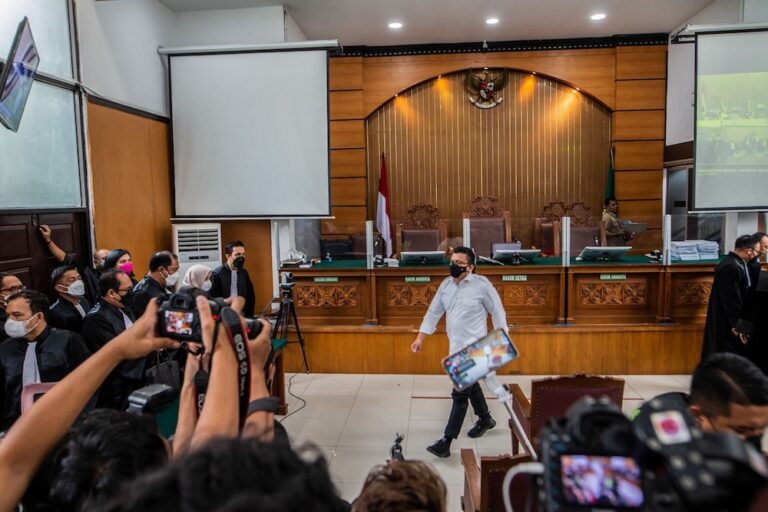(CPJ/IFEX) – According to CPJ, there appears to be an ongoing campaign of intimidation and harassment directed by the Greater Jakarta Military Command against a number of journalists and news outlets in Indonesia. Under the guise of a continuing investigation into a bombing incident that occurred on 18 January 1998, reporters, editors and publishers have […]
(CPJ/IFEX) – According to CPJ, there appears to be an ongoing campaign of
intimidation and harassment directed by the Greater Jakarta Military Command
against a number of journalists and news outlets in Indonesia.
Under the guise of a continuing investigation into a bombing incident that
occurred on 18 January 1998, reporters, editors and publishers have been
visited and questioned repeatedly by military authorities, according to
press reports and CPJ’s sources. At least five journalists have gone into
hiding following visits to their offices by military authorities. Others
have been fired or taken off sensitive assignments, while still others have
been told by their editors to be careful about the kind of stories they
write.
The 18 January 1998 bombing in Tanah Tinggi, Central Jakarta, severely
damaged an
apartment; the military blamed the incident on the banned Democratic
People’s Party (PRD). Military authorities claim to have found a list of 28
journalists and news organizations who have been in contact with the PRD on
a computer file in the damaged apartment, which was said to have been
occupied by the PRD. Surya Paloh, the General Manager of “Media Indonesia”
newspaper, was summoned by the military in late January 1998 to answer
questions about his alleged ties to the PRD. One reporter, Meilani
Dhamayanti, was fired by “Media Indonesia” following a 20 January 1998
report she wrote on the bombing incident that quoted jailed PRD activist
Budiman Soejatmiko disclaiming responsibility for the bombing.
Discussing the allegations against the journalists, the Greater Jakarta
Military Chief, Major General Syafrie Syamsuddin, was quoted by “Media
Indonesia” in February 1998 as saying that some independent journalists are
a threat to national stability because they “claim to be promoting human
rights. But in fact they are violating human rights, because the effect of
their activities harms the wider population.”
Recently, CPJ’s sources have reported that calls and visits from military
investigators have continued at many news outlets. Included on the list of
targeted news organizations are the leading newspapers “Bernas”, “Media
Indonesia”, “Suara Pembaruan” and “Kompas.” The magazines “D&R”, “Panji
Masyarakat” and “Forum Keadilan” have also been questioned, according to
CPJ’s sources.
CPJ believes that threats and intimidation are serious attacks on press
freedom. Visits to newsrooms by military authorities and warnings to
editors to curb
their reporters’ instincts for covering a story, do not serve the interests
of the Indonesian public during this time of concern about the economic and
political situation in the country.
Recommended Action
Send appeals to authorities:
to order the Greater Jakarta Military Command to stop its investigation of
journalists in the wake of the 18 January 1998 bombing
Appeals To
His Excellency Suharto
President
Office of the President
Bina Graha, Jalan Veteran No. 17
Jakarta Pusat, Indonesia
Fax: +62 21 360 517/367 782 / +62 21 345 4438
Please copy appeals to the source if possible.


